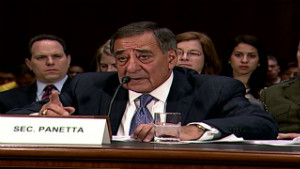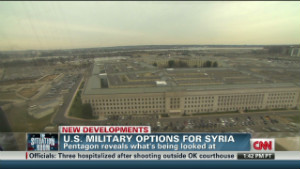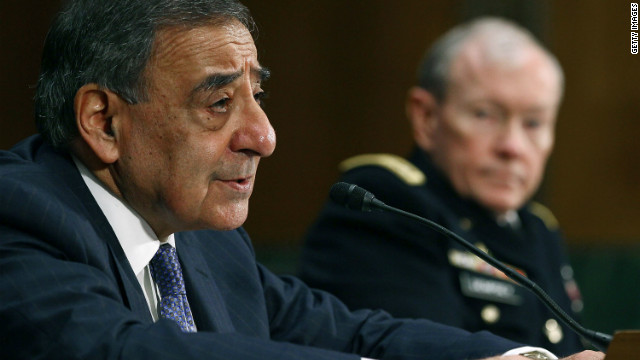Thursday, March 8, 2012
Obama Admin Cites 'Int'l Permission,' Not Congress, As 'Legal Basis' For Action In Syria
Alabama Senator Jeff Sessions secured a stunning admission from Obama's Secretary of Defense, Leon Panetta. The Obama administration believes that the "legal authority" needed to deploy our military is "international legal authority" such as that which might be issued by the U.N.
I know that the Ron Paul crowd believes that every military action is tantamount to war and requires the prior approval of Congress. Of course that is not the case for reason that not all military actions are "war" and for reason that Congress has already approved the temporary use of force by the president acting as commander in chief, under the War Powers Resolution.
But the real stunner here is that Panetta doesn't consider either of those two legal authorities necessary before the president commits our troops to battle. He thinks that the U.N. can authorize that decision.
Now I could be wrong, but wouldn't a president ceding the authority of his office to the U.N. signal that he is ignoring his oath to the Constitution?
PENTAGON AND CNN IN DAMAGE CONTROL MODE
Official: Panetta misinterpreted on 'permission' for Syria intervention
(CNN) -- The Pentagon tried to clarify remarks made by Defense Secretary Leon Panetta, when he told a Senate committtee on Wednesday that the U.S. military is seeking "permission" from a foreign organization to intervene in Syria.
"He was re-emphasizing the need for an international mandate. We are not ceding U.S. decision-making authority to some foreign body," a defense official told CNN.
In testimony to the Senate Armed Services Committee, Panetta had an exchange with Sen. Jeff Sessions, R-Alabama, who said Congress was circumvented when Obama decided to join the NATO coalition in Libya.
Sessions said, "We spend our time worrying about the U.N., the Arab League, NATO and too little time, in my opinion, worrying about the elected representatives of the United States. As you go forward, will you consult with the United States Congress?"

 Panetta: Pressure mounting on Syria
Panetta: Pressure mounting on Syria 
 Military resists intervening in Syria
Military resists intervening in SyriaPanetta replied, "You know, our goal would be to seek international permission. And we would come to the Congress and inform you and determine how best to approach this, whether or not we would want to get permission from the Congress."
Latching onto the words "permission" and "inform," Sessions ripped into Panetta: "Well I'm troubled by that. I think it does weaken the ability of the United States to lead. I do think ultimately you need the legal authority from the United States of America, not from any other extra-territorial group that might assemble."
But even when Sessions gave Panetta a chance to clarify, Panetta continued to say the U.S. would seek "permission" so that there was a legal basis to act.
"I'm really baffled by the idea that somehow an international assembly provides a legal basis for the United States military to be deployed in combat," Sessions said. "I don't believe it's close to being correct. They provide no legal authority. The only legal authority that's required to deploy the United States military is of the Congress and the president and the law and the Constitution."
After the exchange, committee chairman Sen. Carl Levin, D-Michigan, tried to help Panetta clarify further.
"I don't think the word permission is appropriate even in that context. By the way, I think what -- you really corrected it when you said a legal basis in international law would help you achieve an international coalition," Levin said.
"That's correct," Panetta responded.
After the hearing, Sen. Sessions told Security Clearance in an interview that Panetta's comments were "very revealing of the mindset" of the administration. Panetta "seemed so natural in expressing it as if he didn't understand this went against" the fundamentals of our government.
While Sessions said he does not think the U.S. should act alone, he said there are indications that Syrian President Bashar al-Assad is gaining momentum and "the window of opportunity could be closed."
"The delays that are taking place out of a determination to get a major worldwide support, I suppose could be costly," Sessions said in the interview.
The defense official, who did not identify himself because he did not want to speak publicly for the secretary, further explained the rationale for seeking international agreement.
"The legitimacy is greater if there is some form of international mandate. There's a sense that unilateral U.S. action would be perceived in the wrong way, especially in this part of the world. Does the U.S. want to go it alone in another Arab country? That figures into the calculus."
The official said a United Nations Security Council resolution, like the one that authorized action in Libya, isn't necessarily the only way to go about this. "Some kind of mandate from a regional organization could signify this is not just a unilateral effort on our part," he said. This is important not only to the U.S., but to other nations in the region that oppose al-Assad's regime, the source said.
The official also emphasized that international agreement is just one of the concerns. The other part of the equation is the Syrian military and dense population centers, which are big factors in any military intervention, said the source.
"The complexity of that cannot be overstated. This is a very hard problem set we're dealing with."
March 7, 2012
Mr. JONES submitted the following concurrent resolution; which was referred to the Committee on the Judiciary
Whereas the cornerstone of the Republic is honoring Congress's exclusive power to declare war under article I, section 8, clause 11 of the Constitution: Now, therefore, be it
- Resolved by the House of Representatives (the Senate concurring), That it is the sense of Congress that, except in response to an actual or imminent attack against the territory of the United States, the use of offensive military force by a President without prior and clear authorization of an Act of Congress violates Congress's exclusive power to declare war under article I, section 8, clause 11 of the Constitution and therefore constitutes an impeachable high crime and
- misdemeanor under article II, section 4 of the Constitution.
Turkish Newspaper Editor - Zionism the Invisible Force Behind All Upheavals
40 years ago the Arabs were united against Israel, now they are fighting amongst one another. Over many centuries a hidden hand has perfected the manipulation of masses of people everywhere, even in our own democracies where Presidents and Prime Ministers are picked for us. The Orthodox clique are the kernel.
Nesin is the Senior Editor at the Turkish Newspaper
http://olaygazeteonline.co.uk
Subscribe to:
Comments (Atom)
